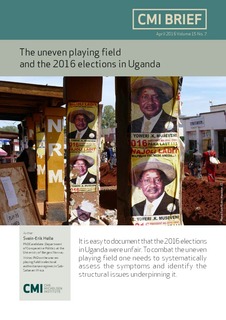| dc.description.abstract | It is easy to document that the 2016 elections in Uganda were unfair. To combat the uneven playing field one needs to systematically assess the symptoms and identify the structural issues underpinning it.
The different parties and observers to #UgandaDecides agree on one thing: the electoral playing field of the February 18 elections was uneven. Losers, winners, election observation missions, civil society organizations, social media users – even President Museveni himself – has complained about unfairness in the electoral process.
Arguably, both the opposition and the incumbent have been treated unfairly during the process. The concept of the uneven playing field is often used selectively to complain about certain aspects of the political process, as in the case of Museveni who argued that the newspaper Daily Monitor favored the opposition. Or, as in the case of Besigye, to argue that the entire electoral process is unfair and therefore must be faced through defiance. Both statements are problematic. Museveni might be right ( although content analysis indicate he is not ), but his focus on just a tiny piece of the playing field makes his statement useless. Besigye’s statement is analytically useless for the opposite reason: his sweeping assessment misses important variations in the playing field, making it easy to point to flaws in his argument.
Describing the Ugandan playing field
Moving beyond such sweeping statements, three issues must be addressed in order to secure an even electoral playing field: fair access to resources, media, and arbiters such as electoral commissions, court and law enforcement agencies. Most importantly, the balance within and between these issues must be acknowledged.
The situation with regards to access to media in Uganda illustrates this. This is actually an area where the playing field is more even than in many other authoritarian regimes. While public broadcasters | |
